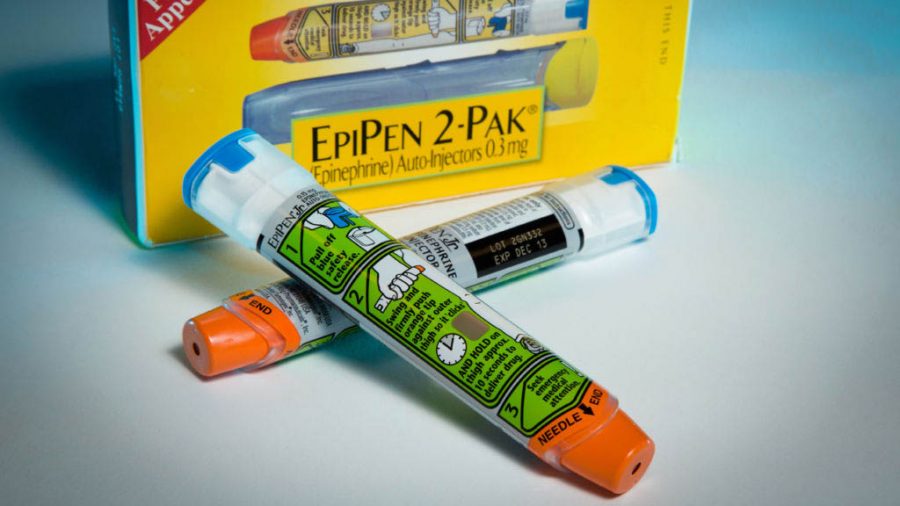Putting the care in health care
Mylan, EpiPen controversy leads to questioning of raised pharmaceutical costs
Examples of epinephrine pens that the Center for Disease Control and Prevention guidelines recommend that schools stock to combat food allergies are photographed in the Washington Wednesday, Nov. 13, 2013. The deaths of two girls in Illinois and Virginia from severe food allergies have helped spur efforts to get schools to stockpile emergency medications that can save lives. That effort has now reached the highest level: President Barack Obama’s desk. The president was expected to sign a bipartisan bill that offers a financial incentive to states if schools stockpile epinephrine, considered the first-line treatment for people with severe allergies. The medication is administered by injection, through preloaded EpiPens or similar devices. (AP Photo/J. David Ake)
There is no set time or place for tragedies to occur. Allergens can strike your body out of nowhere, leaving you little time to react. Your nose swells, your throat closes and your skin begins to change color as your lungs shut down.
The life-saving EpiPen you inject into your thigh shuts down the antibodies that have invaded the immune system after an exposure to an allergen. As vital as this may appear, many people who are in need of this tool are unable to afford it. Nearly 40 percent of children and 30 percent of adults within the United States are affected by allergies.
With no cure, allergies have to be carefully evaluated and watched in order to avoid serious anaphylactic shock, or a deadly allergic reaction. The most effective modern day medicine to prevent serious allergic reactions are EpiPens. EpiPens, a brand of epinephrine autoinjectors, is the emergency device used to treat an allergic reaction while one waits for medical attention.
Epinephrine is a chemical that will clear the lungs and constrict blood vessels until medical help arrives. These injections come in packages of two in order to have a second injection available if medical attention is not found within 15 minutes.
Epinephrine alone costs only a small amount of money. However, when purchased from a pharmacy, patients are having to spend over $600 for a device that costed a simple $13.50 less than a decade ago. Many EpiPen users take advantage of copays, a smaller cost paid upfront for the devices before the insurance companies cover the remaining cost.
The confusion begins when locating the cause for the extreme cost increase. While the insurance companies have remained steady in their coverage plans, it’s been the manufacturers that have been to blame for the additional charges.
In recent news, Heather Bresch, CEO of the pharmaceutical company Mylan, has come under fire from the media for her pay raise in the past six years. Mylan is a pharmaceutical manufacturing company that leads in transforming the EpiPen brand around the country. While families and individuals have been struggling to afford the life-saving medicine prescribed to them, Bresch’s paycheck raised nearly 500 percent to an annual income of $19 million.
The options for EpiPen users has also come into question about having a generic brand of the injection. However, Mylan is the leading manufacturer for EpiPens and the only other option is the epinephrine injector, Adrenaclick. The company credited with this medicine, Impax Laboratories, is unable to fill large amounts of orders for the drug due to their manual processes.
Another downfall customers face when looking to switch companies is the price. While the original EpiPen may have costs up to $600, Adrenaclick is in the market in some areas with a sticker price of $500.
In other words, there are multiple factors in the pricing of medical necessities. The pharmaceutical system within America holds a variety of systems that further the pricing of specific drugs.
For instance, in order to introduce a new drug to the public, it must first go through an arduous research process that can take up to 12 years on average and cost up to $100 million per trial. After clinical trials, the average cost of FDA approval costs nearly $350 million. After approval, the product must be proposed to the public. This is a cost of $1.3 billion.
This being acknowledged, while companies such as Mylan have raised costs themselves, someone has to satisfy the processes of getting the drug from an idea to a safe and reliable medical product.
While specific drugs, such as EpiPens, may only cost a few dollars to create, the techniques of pharmaceuticals must be paid; therefore, this is where the costs increase.
Over the years, as health care systems have evolved, the cost of the product raised in order to maintain the medical requirements through research procedures. Overall, the American health field has created a philosophy of multiple options for different health concerns, and time continues to prove the capabilities of the pharmaceuticals around the country.



